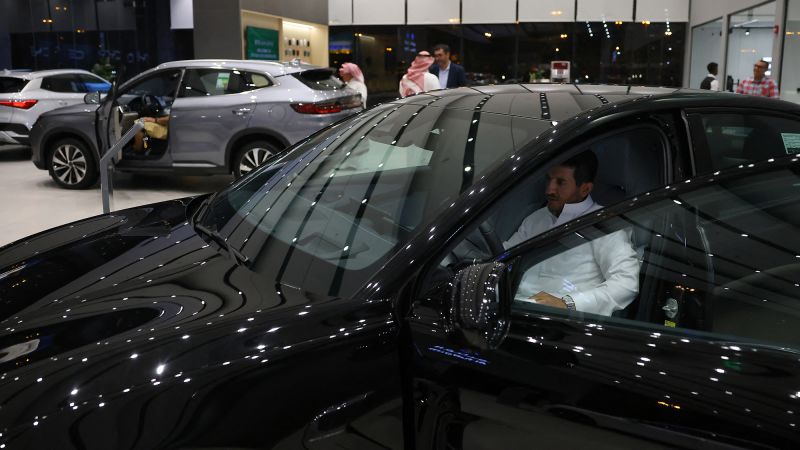Saudi Arabia’s Ambitious Shift from Oil to Electric Vehicles

Electric vehicles (EVs) are becoming increasingly common on roads worldwide, yet in Saudi Arabia, they account for just over 1% of total car sales. This is according to PricewaterhouseCoopers’ (PwC) “eMobility Outlook 2024: KSA Edition,” published in September 2024. Globally, around 18% of all cars sold in 2023 were electric, as reported by the International Energy Agency. Despite this disparity, Saudi Arabia is making significant strides toward embracing electric mobility.
The Electric Vehicle Infrastructure Company (EVIQ) is leading this transformation. Established in late 2023 as a joint venture between the Public Investment Fund (PIF) and the Saudi Electricity Company, EVIQ is working to expand the country’s EV infrastructure. By the end of 2023, there were approximately 285 public charging points, primarily slow chargers. However, in January 2024, EVIQ launched its first fast charging station in Riyadh, with plans to install 5,000 fast chargers across 1,000 locations by 2030.
Challenges and Opportunities in Saudi Arabia’s EV Market
Several factors have contributed to the slow adoption of EVs in Saudi Arabia. High vehicle costs, limited charging infrastructure, and extreme weather conditions pose significant challenges. In 2024, over 60% of available EV models cost more than $65,000, whereas nearly 73% of gasoline-powered models were cheaper. Additionally, generous fuel subsidies mean gasoline remains affordable, with prices around 60 cents per liter.
The country’s vast geography also complicates EV adoption. The distance between its two largest cities exceeds 950 kilometers (almost 600 miles), surpassing the average range of most EVs. Furthermore, the harsh Saudi summers can affect battery performance, requiring additional energy for cooling and impacting range and charging speed.
Building an EV Ecosystem
Despite these hurdles, Saudi Arabia is determined to reduce its reliance on oil and cut carbon emissions. In 2024, oil accounted for 60% of government revenue, while crude oil and natural gas comprised over 20% of the GDP. The government aims for 30% of cars in Riyadh to be electric by 2030. Beyond adopting EVs, Saudi Arabia is “building an entire industrial ecosystem” around them, as noted by Heiko Seitz, Global eMobility Leader at PwC Middle East.
The country plans to become an EV manufacturing hub. PIF is the largest shareholder in Lucid Motors, which opened its first manufacturing facility in Saudi Arabia in 2023. CEER, a joint venture between PIF and Foxconn, aims to launch its first Saudi-produced EV by 2026. Additionally, a joint venture between PIF and Hyundai has begun constructing a manufacturing plant.
Major EV producers are entering the Saudi market. China’s BYD opened its first showroom in May 2024, and Tesla launched its presence in April. The introduction of Chinese models, such as BYD’s Atto 3, priced at approximately $27,000, is expected to drive prices down, making EVs more accessible.
Addressing Range Anxiety and Infrastructure Needs
According to PwC, over 40% of Saudi consumers are considering purchasing an EV within the next three years. EVIQ has already established chargers in Riyadh and Jeddah and introduced its first highway charging station in April. “It’s still really foundational work,” said EVIQ CEO Mohammad Gazzaz. The company plans to add 50 to 60 new charging sites this year, including in smaller cities like Mecca and Medina.
By 2026, Gazzaz anticipates a “minimum viable network” covering 70 to 80% of travel requirements across the Kingdom. “We’re not talking only tier-one, but even tier-two cities, and covering some of those main highways,” he stated. Despite these efforts, Seitz believes that achieving the official target of 30% electric cars in Riyadh will require “an additional push” to make EVs a mass product nationwide.
“Public charging is the main gap, and it’s now a top priority to fix,” said Seitz.
Looking Ahead: Incentives and Future Prospects
A survey by the King Abdullah Petroleum Studies and Research Center and University College London suggests that large-scale EV adoption in Riyadh would likely necessitate government incentives. These could include VAT exemptions for new vehicles, subsidized charging, and free home charger installations, especially during the early stages of deployment. The government has introduced some financial incentives and subsidies for EV buyers, signaling its commitment to the EV revolution.
Experts assert that improved infrastructure will be crucial for advancing the country’s EV transition. “EV prices are falling, model options are growing, and government signals are clear — yet range anxiety remains,” said Seitz. As Saudi Arabia continues to invest in its EV infrastructure, the nation is poised to play a significant role in the global shift toward sustainable transportation.






